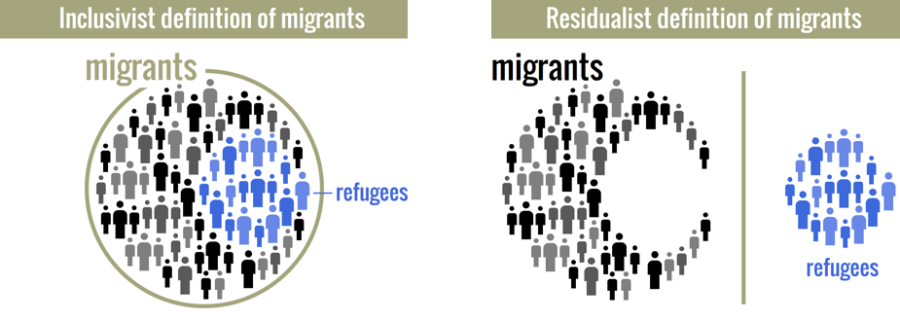The answer to this question has become a hotly disputed issue in international politics and humanitarian work. The purpose of meaningofmigrants.org is to clarify how and why the meaning of migrants matters.
Is there a specific, correct meaning of ‘migrants’?
No. There is no single definition that is universally accepted. While ‘refugees’ are defined in legal terms in the 1951 Refugee Convention, there is no corresponding source that defines ‘migrants’. But the lack of a simple answer doesn’t mean that anything goes.
What are the disagreements and controversies?
The fundamental disagreement concerns whether or not ‘migrants’ is an inclusive label that also includes refugees. This dispute is important, but often muddled in policy debates and communication material.
What are ‘inclusivist’ and ‘residualist’ views?
The inclusivist view holds that migrants are people who have moved from their usual place of residence, regardless of their legal status and their motivations for moving. In other words, migrants include refugees, foreign workers, trafficking victims, trailing spouses, international students, and many other more or less precise categories of individuals.
The residualist view sees migrants as people who have moved from their usual place of residence for every reason other than fleeing war or persecution. They are, in this view, a diverse, residual category of people who are united by the feature of not being refugees.

What are examples of inclusivist definitions?
The UN Migration Agency (IOM) uses a definition of migrants that is explicitly inclusivist. Until a revision in 2019, the wording was as follows:
IOM defines a migrant as any person who is moving or has moved across an international border or within a State away from his/her habitual place of residence, regardless of (1) the person’s legal status; (2) whether the movement is voluntary or involuntary; (3) what the causes for the movement are; or (4) what the length of the stay is.
In line with this definition, the IOM’s Director General (2008-2018) William L. Swing has summarized the relationship between refugees and migrants as follows: ‘All refugees are migrants, but not every migrant is a refugee.’
The United Nations Department of Economic and Social Affairs also uses an inclusivist definition, pointing out that ‘most experts agree that an international migrant is someone who changes his or her country of usual residence, irrespective of the reason for migration or legal status’.
The BBC formulated an inclusivist definition of migrants that is added as a ‘note on terminology’ to online coverage of migration issues:
The BBC uses the term migrant to refer to all people on the move who have yet to complete the legal process of claiming asylum. This group includes people fleeing war-torn countries such as Syria, who are likely to be granted refugee status, as well as people who are seeking jobs and better lives, who governments are likely to rule are economic migrants.
What are examples of residualist definitions?
The primary proponent of the residualist view of migrants is The UN Refugee Agency (UNHCR). The organization’s position is expressed in various media and communication products, but not in a precise definition of ‘migrants’. Based on conversations with UNHCR staff, Somini Sengupta of the The New York Times formulated the following residualist definition:
Anyone moving from one country to another is considered a migrant unless he or she is specifically fleeing war or persecution.
In line with this approach, the UNHCR has sought to describe (as opposed to define) migrants:
Migrants choose to move not because of a direct threat of persecution or death, but mainly to improve their lives by finding work, or in some cases for education, family reunion, or other reasons.
Are the terms ‘refugee’ and ‘migrant’ interchangeable?
No. And nobody with an interest in international migration would say that they are. In fact, posing the question in this way shifts attention away from the actual disagreement about the meaning of ‘migrants’. Proponents of the inclusivist view do not object to making distinctions, but argue that migrants are a broad category that includes refugees as an important, specific, subcategory.
Is ‘refugees and migrants’ a neutral phrase?
No. The phrase ‘refugees and migrants’ implies a residualist view, i.e. that refugees are not migrants. Consider a metaphorical comparison: if someone were to say ‘roses and flowers’ it would mean that a rose is not a flower. There are several alternative formulations, though, if you wish to talk about people on the move without taking a residualist stance.
Read on to discover how an inclusivist definition can help protect rights and develop sound policies.
